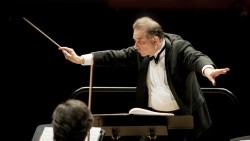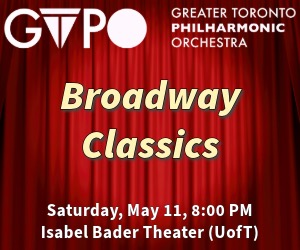The Esprit Orchestra with guests – the Elmer Iseler Singers – provided their audience with a lovely evening of new and newer music on March 31. The fourth concert of their current season opened with Darius Milhaud’s La création du monde (1923). Its first movement of trembling strings against a militaristic timpani set up the introduction of the saxophone, the featured instrument of the piece. The emergent jazz was clearly an invocation of George Gershwin.
The Elmer Iseler Singers, led by Lydia Adams, were simply exquisite in their presentation of Hussein Janmohamed’s Nur: Reflections on Light (2014). In the second and fourth movements, the Singers proved why they are considered in the top rank of choral music performers in this city and beyond. The Singers are lucky to have the Janmohamed in their repertoire and I can’t imagine the composer would have been disappointed with the performance. Clear, crisp and intentional, the choir surrounded the audience from the balcony, in the aisles and from the stage. I have never appreciated the acoustics of Koerner Hall more than through this experience. The graceful presentation was accentuated with Adams’ clear mastery and deep understanding of the work. First premiered at the opening of the Ismaili Centre and Aga Khan Museum in 2014 – this rarely performed piece was a pure pleasure.
Douglas Schmidt’s Sirens (2016), which concluded the first half of the concert, sat beyond my ability to synergize. I have never actually seen a harmonium pump organ (an instrument that is rather noisy to play and noisy sounding) on stage with an orchestra. I found myself thinking that two very distinct things were at play, a coherent orchestral composition and a bellowing organ. Whether or not that was the intention, each seemed to me to exist irrespective of the other.
 The final, and largest, piece of the evening was Esprit music director and conductor Alex Pauk’s new work, Devotions (2016). The Elmer Iseler Singers, under Adams, were the draw for me as a choral beat writer. It’s rare to find new works for orchestra and choir; so it was refreshing to have this opportunity to listen to Alex Pauk’s.
The final, and largest, piece of the evening was Esprit music director and conductor Alex Pauk’s new work, Devotions (2016). The Elmer Iseler Singers, under Adams, were the draw for me as a choral beat writer. It’s rare to find new works for orchestra and choir; so it was refreshing to have this opportunity to listen to Alex Pauk’s.
A big, thick work, I found myself thinking of cinematic movie scores, particularly those akin to Howard Shore’s. Inspired by many religious texts, Devotions fits into a larger conversation that choral composers specifically are having about the secularization of religious music. Or in many cases, the sacredization of secular music. Using religious texts in a non-religious setting is a spiritual experience nonetheless. Pauk’s joins the ranks of other works like Christopher Tin’s Calling All Dawns (2009) and Karl Jenkins’ The Armed Man (1999).
The Elmer Iseler Singers were the dynamos of the evening. Pauk’s composition was not easy or straightforward music and these singers were impeccable. With the skillful use of tuning forks, some of the entries were consistent and well done.
Esprit continues to provide Toronto audiences with a world-class new music experience.




